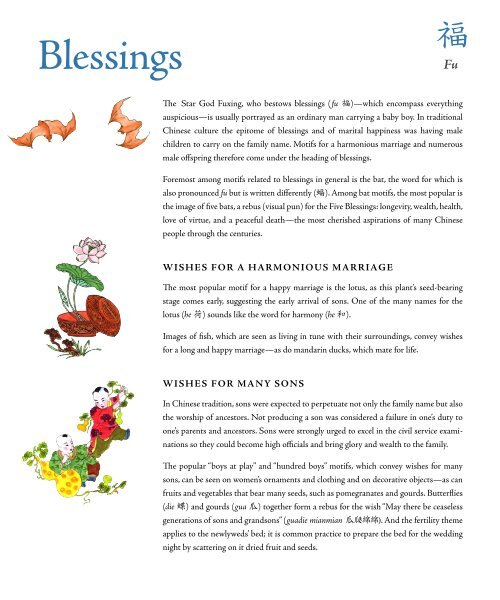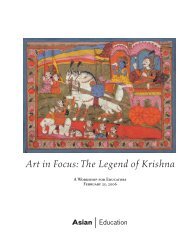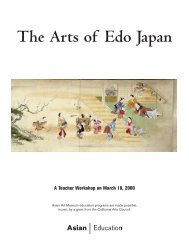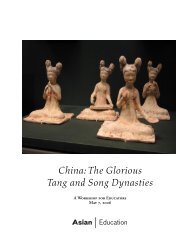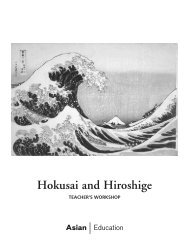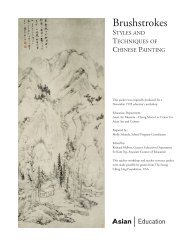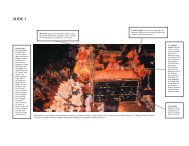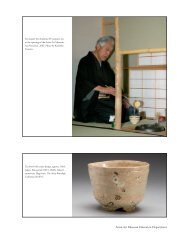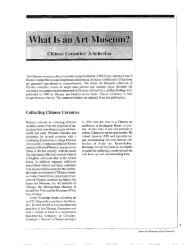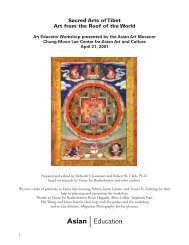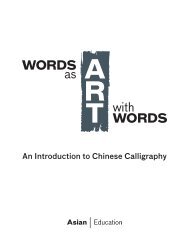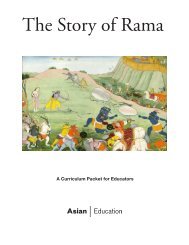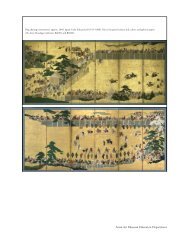Hidden Meanings in Chinese Art (.pdf) - Asian Art Museum | Education
Hidden Meanings in Chinese Art (.pdf) - Asian Art Museum | Education
Hidden Meanings in Chinese Art (.pdf) - Asian Art Museum | Education
Create successful ePaper yourself
Turn your PDF publications into a flip-book with our unique Google optimized e-Paper software.
Bless<strong>in</strong>gs<br />
福<br />
Fu<br />
The Star God Fux<strong>in</strong>g, who bestows bless<strong>in</strong>gs (fu 福 )—which encompass everyth<strong>in</strong>g<br />
auspicious—is usually portrayed as an ord<strong>in</strong>ary man carry<strong>in</strong>g a baby boy. In traditional<br />
Ch<strong>in</strong>ese culture the epitome of bless<strong>in</strong>gs and of marital happ<strong>in</strong>ess was hav<strong>in</strong>g male<br />
children to carry on the family name. Motifs for a harmonious marriage and numerous<br />
male offspr<strong>in</strong>g therefore come under the head<strong>in</strong>g of bless<strong>in</strong>gs.<br />
Foremost among motifs related to bless<strong>in</strong>gs <strong>in</strong> general is the bat, the word for which is<br />
also pronounced fu but is written differently ( 蝠 ). Among bat motifs, the most popular is<br />
the image of five bats, a rebus (visual pun) for the Five Bless<strong>in</strong>gs: longevity, wealth, health,<br />
love of virtue, and a peaceful death—the most cherished aspirations of many Ch<strong>in</strong>ese<br />
people through the centuries.<br />
W I S H E S F O R A H A R M O N I O US MARRIAG E<br />
The most popular motif for a happy marriage is the lotus, as this plant’s seed-bear<strong>in</strong>g<br />
stage comes early, suggest<strong>in</strong>g the early arrival of sons. One of the many names for the<br />
lotus (he 荷 ) sounds like the word for harmony (he 和 ).<br />
Images of fish, which are seen as liv<strong>in</strong>g <strong>in</strong> tune with their surround<strong>in</strong>gs, convey wishes<br />
for a long and happy marriage—as do mandar<strong>in</strong> ducks, which mate for life.<br />
W I S H E S F O R M A N Y S O N S<br />
In Ch<strong>in</strong>ese tradition, sons were expected to perpetuate not only the family name but also<br />
the worship of ancestors. Not produc<strong>in</strong>g a son was considered a failure <strong>in</strong> one’s duty to<br />
one’s parents and ancestors. Sons were strongly urged to excel <strong>in</strong> the civil service exam<strong>in</strong>ations<br />
so they could become high officials and br<strong>in</strong>g glory and wealth to the family.<br />
The popular “boys at play” and “hundred boys” motifs, which convey wishes for many<br />
sons, can be seen on women’s ornaments and cloth<strong>in</strong>g and on decorative objects—as can<br />
fruits and vegetables that bear many seeds, such as pomegranates and gourds. Butterflies<br />
(die 蝶 ) and gourds (gua 瓜 ) together form a rebus for the wish “May there be ceaseless<br />
generations of sons and grandsons” (guadie mianmian 瓜 瓞 綿 綿 ). And the fertility theme<br />
applies to the newlyweds’ bed; it is common practice to prepare the bed for the wedd<strong>in</strong>g<br />
night by scatter<strong>in</strong>g on it dried fruit and seeds.
Rank and Wealth<br />
祿<br />
Lu<br />
W I S H E S F O R PAS S I N G E XA M I NAT I O N S<br />
Pass<strong>in</strong>g the civil service exam<strong>in</strong>ations was important <strong>in</strong> dynastic Ch<strong>in</strong>a: It opened the<br />
door to atta<strong>in</strong><strong>in</strong>g rank and wealth, which would br<strong>in</strong>g honor to one’s family. Though<br />
traditional Ch<strong>in</strong>ese society was class conscious, the exams were <strong>in</strong> pr<strong>in</strong>ciple open to all. So<br />
a young man from an obscure village might, by years of <strong>in</strong>tense study, propel himself—<br />
and his family—<strong>in</strong>to a much higher socioeconomic situation.<br />
Students were recruited <strong>in</strong>to the state bureaucracy through a series of rigorous nationally<br />
adm<strong>in</strong>istered tests based on knowledge of classical texts and on literary skills def<strong>in</strong>ed<br />
centuries before. Civil service candidates might compete at as many as four levels of<br />
exam<strong>in</strong>ation, the first three be<strong>in</strong>g local or prefectural, prov<strong>in</strong>cial, and metropolitan. A<br />
f<strong>in</strong>al exam for a select group would take place before the emperor; from this group, the<br />
First Scholar (zhuangyuan 狀 元 ) would be chosen.<br />
The expression “three successive firsts” (liangzhong sanyuan 連 中 三 元 ) implies a wish<br />
for candidates to successfully pass the three highest levels of exam<strong>in</strong>ation (prov<strong>in</strong>cial,<br />
metropolitan, and imperial). In decorative arts, this wish is conveyed through the image<br />
of three citrons (sanyuan 三 櫞 ), a pun for wish<strong>in</strong>g the candidate to come first <strong>in</strong> all three<br />
exams (sanyuan 三 元 ).<br />
Other images associated with this theme that can be seen on objects <strong>in</strong> this exhibition<br />
<strong>in</strong>clude a scholar pluck<strong>in</strong>g a branch of osmanthus blossoms from the moon, which is a<br />
pun on the phrase “becom<strong>in</strong>g the First Scholar <strong>in</strong> the imperial exam”; lotus and egrets,<br />
a pun on “pass<strong>in</strong>g exams all the way”; and swallows and apricot blossoms, a pair<strong>in</strong>g that<br />
represents successful candidates attend<strong>in</strong>g the imperial banquet <strong>in</strong> their honor.
祿<br />
Lu<br />
W I S H E S F O R R A N K<br />
Lux<strong>in</strong>g ( 祿 星 ), the Star God of Rank and Official Salary, is usually depicted as an official<br />
on his way to court wear<strong>in</strong>g a brocade robe and a jade-encrusted belt and carry<strong>in</strong>g a<br />
tablet (an item of court paraphernalia). Sometimes, he is represented as a deer (lu 鹿 ), as<br />
the word for this animal sounds like “official salary” (lu 祿 )—the money that arises from<br />
hav<strong>in</strong>g governmental rank.<br />
In ancient Ch<strong>in</strong>a, rank was equated with wealth; once a man became an official he was<br />
more or less set for life. Parents ardently wished their sons to become scholars <strong>in</strong> order that<br />
they might pass the civil service exam<strong>in</strong>ations and become officials. This wish extended<br />
to ris<strong>in</strong>g <strong>in</strong> rank and to keep<strong>in</strong>g an official position <strong>in</strong> the family.<br />
The monkey (hou 猴 ) is an important symbol of rank because its name is a pun for a highrank<strong>in</strong>g<br />
noble (hou 侯 ). The dragon and phoenix, emblems of the emperor and empress,<br />
also suggest rank and power.<br />
W I S H E S F O R W E A LT H<br />
Prosperity could be accumulated not only from the official salary (the most prestigious<br />
means), but also through bus<strong>in</strong>ess ventures, <strong>in</strong>heritance, and so on. Wealth and<br />
honor are symbolized by, among other th<strong>in</strong>gs, the peony (mudan 牡 丹 , fugui hua 富 貴 花 )<br />
because this flower was first cultivated <strong>in</strong> the imperial gardens. Wishes for wealth can<br />
also be represented by gold <strong>in</strong>gots and co<strong>in</strong>s, or fish (yu 魚 ), a pun for abundance (yu<br />
餘 ). Variations on the fish motif <strong>in</strong>clude a pond filled with goldfish (j<strong>in</strong>yu 金 魚 ), which<br />
signifies a household filled with gold (j<strong>in</strong> 金 ) and jade (yu 玉 ). This association is one of<br />
the reasons some Ch<strong>in</strong>ese keep goldfish <strong>in</strong> their homes and offices.
Longevity<br />
壽<br />
Shou<br />
Longevity ranks first among the Five Bless<strong>in</strong>gs, which also <strong>in</strong>clude wealth, health, love of<br />
virtue, and a peaceful death. The Star God Shoulao ( 壽 老 ), a popular god of longevity,<br />
is depicted as a benevolent old gentleman who has a large cranium and holds a staff and<br />
the peach of immortality.<br />
As the primary symbol of longevity, the peach is of paramount importance <strong>in</strong> Ch<strong>in</strong>ese<br />
culture, and it is one of the most popular decorative motifs. The peach br<strong>in</strong>gs to m<strong>in</strong>d<br />
Xiwangmu ( 西 王 母 ), the Queen Mother of the West, who had a peach orchard <strong>in</strong> her<br />
mounta<strong>in</strong> abode. Her peach trees would bloom every three thousand years, and the fruit<br />
took just as long to ripen. Harvest<strong>in</strong>g these peaches was cause for great celebration; many<br />
of the immortals—also regarded as gods of longevity—were <strong>in</strong>vited to attend the Queen<br />
Mother’s Peach Banquet and to partake of the fruit of immortality.<br />
Other prom<strong>in</strong>ent symbols of longevity <strong>in</strong>clude the long-grow<strong>in</strong>g p<strong>in</strong>e and cypress, the<br />
supposedly long-liv<strong>in</strong>g crane and deer, the ribbon-tailed bird, and the sacred fungus of<br />
immortality.
Peace and<br />
Wish Fulfillment<br />
平 安<br />
P<strong>in</strong>g’an<br />
如 意<br />
Ruyi<br />
In traditional Ch<strong>in</strong>a, often several generations of a family lived under one roof, so wishes<br />
for peace and harmony <strong>in</strong> marriage and family relations were especially important. Emperors<br />
wished for a peaceful reign and for their descendents to stay on the throne forever.<br />
The elephant, through a rather complicated pun, is associated with peaceful and harmonious<br />
times. Before the <strong>in</strong>vention of paper, strips of bamboo (zhu 竹 ) were used for send<strong>in</strong>g<br />
messages of peaceful tid<strong>in</strong>gs, which is how bamboo came to be associated with peace.<br />
The Ch<strong>in</strong>ese term ruyi ( 如 意 ) means “as you wish,” which is shorthand for “May all your<br />
wishes come true.” In Ch<strong>in</strong>a people customarily express wishes for others to have good<br />
fortune and for all their wishes to be granted (jixiang ruyi 吉 祥 如 意 ).<br />
The wish-grant<strong>in</strong>g wand (also ruyi 如 意 ), whose head resembles the sacred fungus of<br />
immortality (l<strong>in</strong>gzhi 靈 芝 ), is the most important symbol for the grant<strong>in</strong>g of wishes.<br />
Sometimes the wand’s head is used as a motif to embellish porcela<strong>in</strong>s, furniture, and other<br />
decorative arts. This popular motif takes a variety of other forms, <strong>in</strong>clud<strong>in</strong>g clouds.


